Hayfaa Tlaiss and colleagues (2017) carried out 17 exploratory in-depth interviews with partners and managers in this
Question:
Hayfaa Tlaiss and colleagues (2017) carried out 17 exploratory in-depth interviews with partners and managers in this multinational firm. Here is a flavour of some of their findings:
Talent definitions
These varied and included ‘the young ones’, ‘high potential’ individuals, ‘those who show managerial capabilities’, ‘those who could occupy important positions in the future’ and ‘those who could build up/increase our clientele base’.
Formal policies/practices/initiatives to retain talent
While a few spoke for formal retention schemes, the majority did not. For example, one interview explained that there were no formal policies but that they would actively try and keep someone if they deserved it and they didn’t want the competition to recruit them. Others said they retained people without being aware of it; and that annual performance interviews were a time to negotiate to encourage retention.
How talent is retained in practice Salary increases, faster promotion and higher bonuses were key, but also education and training and development opportunities were used. They recognised that the work environment was important and that talented employees liked to be appreciated and were provided with challenging work and autonomy. They recognised that main causes of dissatisfaction were the relationship with their manager, and also lack of consideration of their needs and ideas and poor communication. They did try, however, to provide a participative approach and recognise the desire for some flexibility and work–life balance.
Why retain talent?
The focus here was on the direct costs of losing talent as the employee was considered an investment in terms of recruitment, training and development. The majority of interviewees identified a link between retaining talent and firm performance.
Questions
1. How would you describe this company’s approach to defining talent? Justify your answer
2. How could their overall approach to talent retention be improved? Identify specific actions they could implement.
3. Is their view of the reasons to retain talent valid? Explain why or why not.
4. What other reasons might there be for retaining talent?
Step by Step Answer:

Human Resource Management
ISBN: 9781292261645
11th Edition
Authors: Derek Torrington, Laura Hall, Stephen Taylor, Carol Atkinson





